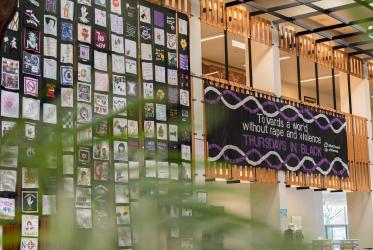Gender-based violence and attacks on foreign nationals in South Africa have left communities wondering where to turn. In a visit of solidarity, a World Council of Churches (WCC) Pilgrim Team visited the nation from 7-12 December.
“This coming together is a symbol of hope,” said Bishop Malusi Mpumlwana of the Ethiopian Episcopal Church. He is also general secretary of the South African Council of Churches. In spite of initial reservations from some, he said that by the end of the visit: “We recognized that God had done this and we are grateful. We like to believe that even as you have immersed yourself with us in our ugliness, you will find it impossible not to pray for us.”
A listening journey
The pilgrimage was motivated by two pervasive and worrying issues that recently received increased local and global media attention: unacceptable levels of gender-based violence and femicide in South Africa, and violence toward foreign nationals.
A representative of the South African Commission for Gender Equality spoke of the sense of impunity of perpetrators, exacerbated by some police officers acting as perpetrators and collaborators and leading to “women dying with protection orders in their pockets.”
Dr Nigussu Legesse, executive director of the Consortium of Christian Relief and Development Associations based in Ethiopia, said that because xenophobia has also had a severe impact on his countrymen in South Africa, it was important to be part of this mission. He highlighted his new understanding of the “…serious, serious challenge for the government of South Africa. The scale of the problem, the complexity of the issues...” He emphasized that solutions lie not only in South Africa, but that regional problems will have to be addressed.
A painful journey
An essential part of the visit was listening to those providing services in this challenging area.
Rev. Bafana Khumalo, director of Strategic Partnerships and one of the co-founders of Sonke Gender Justice, emphasized the role of an unhealthy theology of male headship in perpetuating gender-based violence: “We cannot be silent if the body of Christ is screaming out that it is being raped,” he said.
Church actors involved in ministry in these areas shared their challenges and told pilgrims of feeling vulnerable and unsupported by the church locally and globally.
Most importantly, pilgrims listened to the voices of those directly affected – women who are and have been abused, victims of sexual violence and migrants facing human rights abuses.
Migrants, refugees and internally displaced persons shared experiences of physical and human rights abuses. There were also sadly tales of pastors fanning the flames of discontent between groups of people.
At a shelter of People Opposing Women Abuse, a young woman shared her ‘every day experience’ of repeated rape and abuse, even to the extent of being prostituted by a family member to survive: “Heaviness is there, you carry all the pain with you, you are all over the place. If your emotions are all over the place, it is hard to pray.” She challenged the church to care for victims and survivors and address gender-based violence in church: “They are there! How are you going to deal with it?”
An experiential journey
A visit to an installation art exhibit confronted participants with the realities they heard about in a stark visual way. Translating the “Republic of South Africa” into the “Republic of Sexual Abuse” and transforming national symbols into those of this new republic brought home the realities of living in this alternate republic in new and challenging ways.
Dr Evelyn L. Parker, from WCC Commission of Churches on International Affairs, said she had experienced many examples of art as conscientization, but that this was the “best protest art I have seen in my life.”
Bishop Victor Phalana, of the Catholic Diocese of Klerksdorp said that the experience was not only intellectual but emotional and visceral: “I feel as if I am in theatre being operated on while I am watching and feeling.”
Bishop Mpulwana spoke about the council's “In your face campaign” and said this exhibition could be presented in cathedrals and churches. His spoke of priests and ministers who have no idea what gender-based violence means and suggested that this exhibition should be part of the curriculum of pastors and ministers.
A spiritual journey
The Pilgrim Visit was, however, more than just another journey together of interested parties on important issues. Rather, it was a pilgrimage immersed in and guided by continual spiritual reflection.
In spite of the reality, as described by the president of South Africa, that “the light has been overshadowed by the ugly manifestations of what happened,” there were many indications of hope from all sectors.
Case studies from churches and faith-based organizations responding to these challenges showed many signs of hope and transformation. Increased communication and collaboration have the potential to augment this hope and transformation significantly.
The history of accompaniment from the churches to those in need, the history of the accompaniment of the South African Council of Churches to the local churches, and the history of accompaniment of the WCC to South Africa are particular signs of hope in bringing justice and peace, healing a context filled with conflict, injustice and pain.
Another sign of hope, but also a challenge for the church in future theological reflection, is the renewed appreciation and understanding of Imago deo as a primary consideration for all people no matter their sex, gender, gender orientation or race - or even if they are perpetrators of violence.
The pilgrims from the South African Council of Churches and the WCC committed to continuing the journey to address justice and peace in the areas of gender-based violence and xenophobia together, and issued a pastoral letter to share their commitment with the global ecumenical movement.
Read the full text of the pastoral letter
WCC delegation meets with South African President Ramaphos (WCC press release 09 December 2019)








